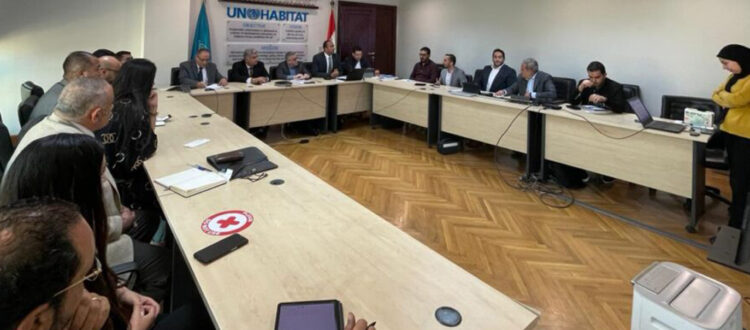“Bus Systems & Energy Transition: Socially Responsible Shifts Towards Cleaner Buses in Egypt” Roundtable
On December 8th, 2022, the UN-HABITAT Egypt Country Office hosted and co-organized in cooperation with CEDARE & FES Egypt Office a roundtable workshop titled “Bus Systems & Energy Transition: Socially Responsible Shifts Towards Cleaner Buses in Egypt”. The meeting brought together experts and key players in the public transport industry, specifically Bus Systems, for the aim of discussing Egypt’s aligning plans with the global commitments announced at the COP27 as well as the post COP updates and recommendations and how to translate them into actions in 2023. Participants included experts and executives from the Ministry of Transport, public authorities, private sector representing bus manufacturers, service providers, local operators, battery chargers’ manufacturers/assemblers, and consultants.
The opening remarks were given by Dr. Hossam Allam, CEDARE’s Sustainable Growth Regional Programme Director, Dr. Ahmed Dorghamy, Basic Services and Climate Change Programme Officer at UN-HABITAT Egypt Country Office, and Mr. Waleed Mansour, Climate and Energy Program Manager at FES Egypt Office.
Stakeholders’ interventions and presentations identified the main challenges for transition in Egypt as: 1. High sulfur in diesel fuel implying that no emission control devices are used throughout Egypt to date. Low Sulfur is needed in addition to other efforts, in order to address the majority of the air pollution challenges. 2. Diesel fuel price and vehicle specifications result in low-costs of diesel buses. This does not reflect the real health and environmental costs of diesel buses in Egypt. As a result, the Total Cost of Ownership of Diesel fuel vehicles in Egypt is misrepresented which, in turn, slows down the penetration of electric buses. 3. Electrification of vehicles is still in need of strategic planning at a national or city level and funding support is necessary.
The roundtable resulted in several recommendations: 1. Political will and diesel fuel quality regulations and technologies: Setting standards for diesel fuel (low sulfur standards) followed by a gradual phase-out will help electric buses be more competitive and start closing the gap of TCO. 2. TCO studies and System Level Solutions: Stakeholders must share different studies of TCOs that correspond to the local context and prices in Egypt, and also the specific system requirements for each city/urban area. planning should not be based on TCO only but also on the specific system-level solution and charging strategy which can significantly reduce overall costs. 3. Private sector support is essential. 4. Participants confirmed with examples that diverse technology options are plentiful, including examples of BRT buses (articulated and double-articulated buses). 5. Infrastructure support is a prerequisite.
This roundtable is another joint activity between the three partner organizations UN-HABITAT, FES Egypt Office & CEDARE on enhancing “Climate Justice & Sustainable Mobility in Urban Planning” and sustainable urban solutions. At the end of the workshop, the participants stressed the vital need to hold more specialized experience-exchange events to ensure further and effective collaboration.
